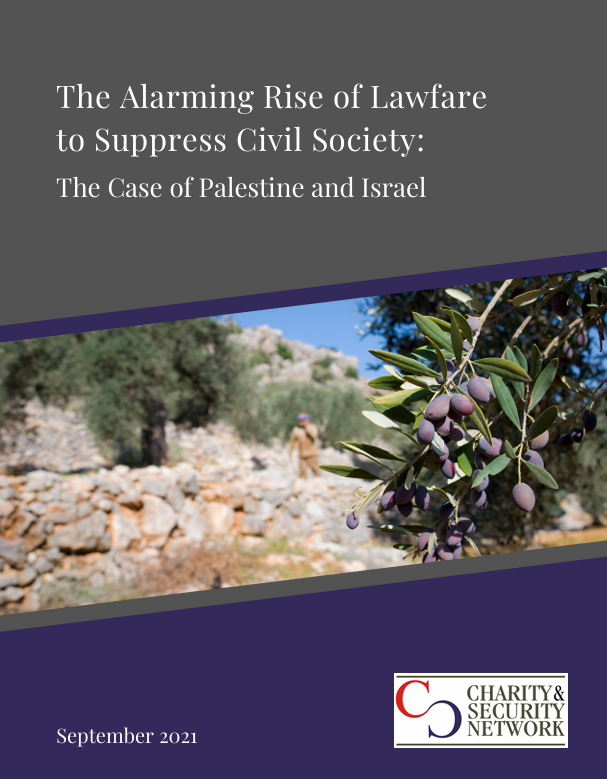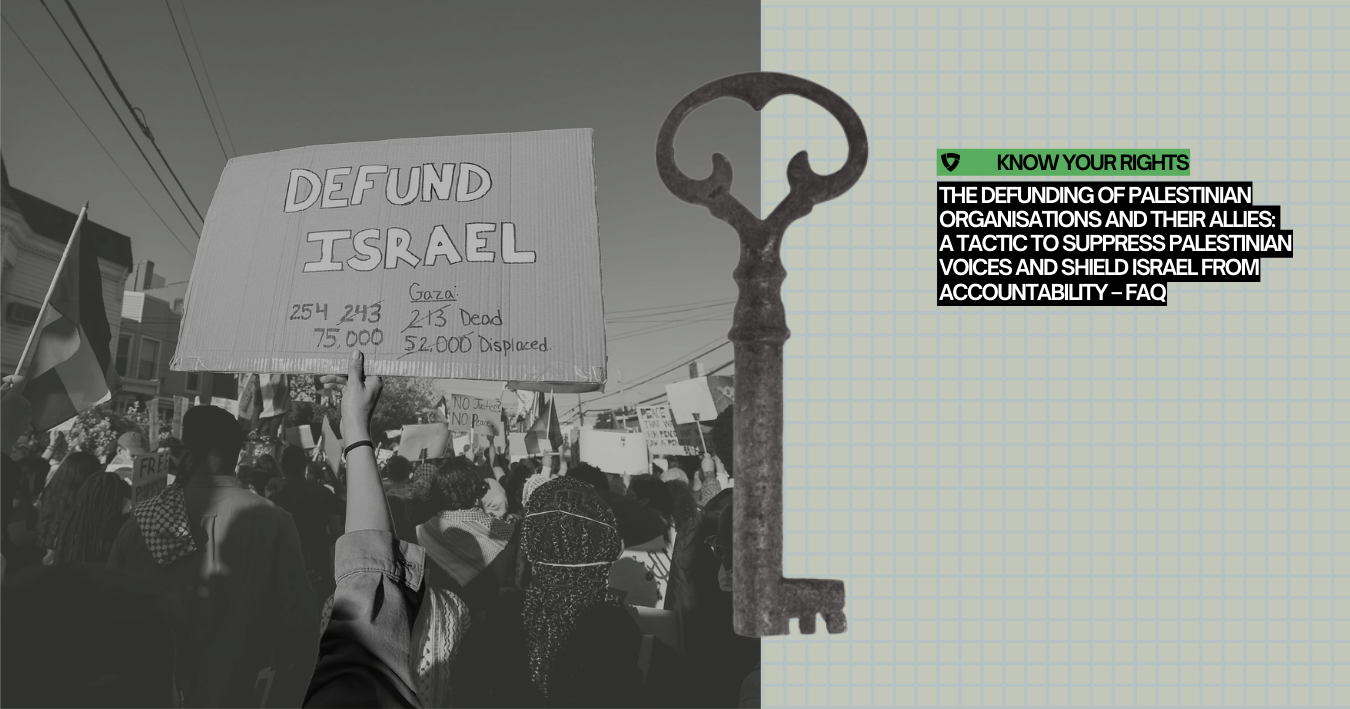The Defunding of Palestinian Organisations and Their Allies: a Tactic to Suppress Palestinian Voices and Shield Israel from Accountability – FAQ
As an organisation defending and empowering the Palestinian movement as well as supporting Palestinian agency, the ELSC has recorded hundreds of cases of repression against Palestine advocacy since its creation in 2019.
In recent months, we have monitored a drastic increase in the level of anti-Palestinian repression. At the same time, we have witnessed an unprecedented movement of solidarity, with millions of people protesting in the streets and universities, engaging in economic and academic boycott campaigns. The stronger the movement, the higher the level of repression. In fact, as solidarity increases, repression by the police and governments supporting the Israeli government is increasing hand in hand.
The mechanisms of silencing vary in form but are in force across countries in Europe. The ELSC’s Monitor team has been analysing these mechanisms and documenting anti-Palestinian racism since 2019. These repressive methods are used to silence Palestinians and their allies and include censorship, threats of disciplinary actions or lawsuits, false allegations of terrorism and antisemitism and other smear campaigns, which can result in defunding of Palestinian organisations.
What is defunding and who are the actors involved?
Economic damage is one of the tools used by anti-Palestinian actors to try to silence Palestinian voices and shrink their space of action.
Since Palestinian civil society organisations (CSOs) resisting the Israeli occupation and colonisation have had to progressively rely on foreign funding to carry out their activities, the latter became a target for anti-Palestinian groups, such as NGO Monitor, UK Lawyers for Israel (UKLFI), the International Legal Forum, which strictly follow Israeli’s government agenda. They target institutional and private donors with false allegations of CSOs’ ties with terrorism and/ or antisemitic behaviour and statements, to pressure them into halting funding. On one hand, they allege that CSOs either directly finance proscribed groups (i.e. entities/ groups listed in the EU and UN sanction lists) by diverting donors’ funds or that employees and board members of these CSOs are affiliated with a proscribed group. On the other hand, they groundlessly claim that CSOs and/ or their members published antisemitic statements on social media and have antisemitic behaviours, while such statements and behaviours fall within the protected freedom of expression.
Furthermore, the media contributes to misinformation by amplifying baseless allegations online, thus tarnishing Palestinian CSOs ’reputation. This is creating a chilling effect, as donors tend to also rely on such allegations spread online.
Smear campaigns aim to isolate Palestinian rights activists, organisations and collectives from other interconnected justice movements. Being scrutinised by the media has severe effects on an individual’s mental health, professional and personal relationships and on an organisation’s financial and psychological stability. When a Palestinian rights advocate or organisation is smeared with unfounded allegations of antisemitism or support for terrorism, it also impacts the advocacy for Palestinian rights more broadly.
Such smear campaigns are part of a larger attack by the Israeli government and anti-Palestinian groups on Palestinian CSOs and International Organisations in solidarity with Palestinians. The aim is to shrink their space of action and eventually prevent CSOs from operating.

Lawfare attacks occur when actors abuse a country’s legal system in order to harass or undermine civil society organisations. Lawfare can include litigation, regulatory complaints, letters to administrative agencies, the request of investigations into civil society organisations, and pressure campaigns aimed at cutting off organisational funding. Lawfare actors generally use disinformation and intentionally manipulate or misrepresent facts in these attacks. Even though these legal claims are baseless and usually end up being dismissed or thrown out by the courts, they still come at a high cost to organisations which must reallocate their resources to defend themselves against the allegations, distracting organisations from their operations and crucial work. As stated in Charity & Security Network’s report, The Alarming Rise of Lawfare to Suppress Civil Society: The Case of Palestine and Israel:
While they rarely prevail on the merits or succeed in forcing settlements on [organizations], the costs and chilling impacts of lawfare attacks further exacerbate the shrinking civic space problem.
What is the role of the Israeli government in the defunding of Palestinian organisations and their allies?
In May 2023, an investigation report led by the United Nations Human Rights Council’s ‘Independent International Commission of Inquiry on the Occupied Palestinian Territory, including East Jerusalem, and Israel’ stated that the restriction of civic space for Palestinians is the result of an “intentional strategy, pursued by the Government of Israel, of delegitimising and silencing civil society”.
Such strategy would be further confirmed by the leaked Israeli Ministry of Intelligence report dated 7th July 2021 and entitled The Palestinian Battle for Area C – Creating a Security Situation on the Ground, Description and Significance, revealing the government’s plan to continue the takeover of Palestinian land and progressive ethnic cleansing of the occupied West Bank. The strategy includes criminalising Palestinian civil society working for steadfastness on the land, as well as sabotaging international financial and material support to Palestinian presence and projects.
Furthermore, as highlighted in the report Israeli assault on Palestinian civil society: the case of the 6+1 criminalised organisations, recently published by the Catalan organisations Escola de Cultura de Pau and Associació Hèlia:
Attempts to silence Palestinian organisations that document and expose human rights violations in different areas have been interpreted as a result of Israeli authorities’ interest in avoiding accountability internationally.
While donors are not provided with credible and founded evidence, funding is still discontinued and difficult to regain. Without funds, CSOs are forced to limit their activities and, in some instances, to shut down. Preventing CSOs from performing their activities is a violation of their right to freedom of association.1
Tarnishing the reputation of these Palestinian actors and trying to put an end to international funding is a cornerstone of Israeli policy […] a way of silencing them in order to shield Israel’s impunity.
Agnese Valenti, ELSC Senior Legal Officer
Read more in this article published by Swiss Newspaper Le Temps about the arbitrary decision of the Swiss Ministry of Foreign Affairs to suspend and cut funding to Palestinian organisations.
Has the defunding of Palestinian organisations increased since October 7th?
Various European countries and donors decided to suspend and/ or review their financial support for Palestinian organisations based on the argument that they had to verify that the funds would not be diverted to terrorist organisations: yet no diversion of funds have been substantiated.
Furthermore, for the first time, due to pressure received by anti-Palestinian groups, donors raised the “incitement to hatred” argument, equating failure to condemn Hamas or any reference to “Palestinian resistance” to antisemitism and violence. The European Commission announced that specific clauses on incitement to hatred will be included and/ or emphasized in future calls and specific monitoring-mechanisms to check the CSOs and employee’s social media will be implemented. This is a blatant violation of the CSOs and their employees’ freedom of expression.
Thanks to EuroMed Rights Network and the ELSC Monitor team’s work, we have now an accurate picture of the extent of this phenomenon.
- As registered by the ELSC Monitor team, since October 7th in 37 instances, private and/ or public donors suspended, reviewed and/ or withdrew their financial support to civil society organisations or groups. This led to the Palestinian CSOs or groups advocating for Palestinian rights involved to struggle in completing their projects, continuing their work or paying their staff.
- At the end of 2023, EuroMed Rights Network launched a survey designed to provide an overview of the initiatives taken by European public and private donors to scrutinise, freeze, audit, or defund Palestinian organisations since October 7th, 2023, in relation to previous defunding initiatives. The survey presented seven mandatory and one optional question aiming to gather specific information about the defunding process that took place since October the 7th.
Read more here
The survey gathered inputs from 28 organisations in different countries including Palestine, Morocco, Egypt, and Turkey.
It emerged that:
- 37.5% of respondents had to submit extra documents to their funders since October 7th. These included detailed descriptions of compliance with the code of conduct and of measures in place to ensure that anti-incitement clauses were respected. Requirements also included an overview of project focus, partner organisations, budget, and time frame, in addition to clarification on the organisations’ position regarding certain social media posts made by board members. In other cases, specifically the Swiss one, the review was conducted without any involvement of the concerned organisations in the process.
- In 53.85% of the cases observed, defunding has been announced since October 7th, mainly by Sweden, Denmark, Switzerland, and Germany, in addition to private donors (while only 8 of respondent had been subjected to defunding before October 7th). In several cases, these actors provide core funding to these organisations. In some cases, programmes were frozen without made without prior consultation with the organisations.
- In 37.50% of cases, projects for 2024 have been postponed until further notice.
- The funding threatened varies from 35.000 to over 950.000 USD, with some organisations losing 30% of their total core funding.
- Overall, the defunding exercise has affected the operational capacity of 65% of respondents. Organisations had to rethink their financial sustainability amid a major human rights crisis, thus diverting energies away from core work.
This results in the termination of certain activities; organisations downsizing; and reduction in the workforce, thus hindering the organisations’ ability to carry out their mandate.
As requested by the Special Procedures of the UN Human Rights Council in a statement dated 13 February 2024:
Western countries and donors should immediately reverse their recent decision to suspend or restrict funding to vital Palestinian and Israeli civil society organisations that have been working on human rights for years. These measures, based on apparent unsubstantiated allegations related to diverting funding to “terrorist entities”, and specifically targeting civil society working on Palestinian rights, infringe the principle of non-discrimination, and violate the right of associations to seek, receive and use financial resources.
[…] suspending or halting funding to entire organisations, are grossly disproportionate [measures], appear politically motivated and contribute to collective punishment against Palestinian civilians already subjected to immense suffering, killing and starvation.
A Case study: the Swiss Federal Department of Foreign Affairs suspended financial support to 11 Palestinian and Israeli NGOs
On October 25th, 2023, the Swiss Federal Department of Foreign Affairs (FDFA) suspended financial support to 8 Palestinian and 3 Israeli NGOs supporting Palestinian rights (Adalah, Al-Shabaka, Gisha, 7amleh, Hamoked, Jerusalem Center for Legal Aid and Human Rights-JLAC, MIFTAH, Palestinian Centre for Human Rights-PCHR, Palestinian Network of NGOs-PNGO, Physicians for Human Rights Israel-PHRI, Women’s Centre for Legal Aid and Counselling- WCLAC) due to “the new situation that has prevailed since the 7th of October and the resumption of hostilities in the Middle East”. They took this decision to “make it possible to carry out an in-depth analysis of the compliance of these organisations’ communications with the FDFA’s Code of Conduct and anti-discrimination clause, to which external partners are subject.” While it resumed funding to 8 of these organisations, the FDFA publicly mentioned it would not renew the contract with Palestinian organisations Al-Shabaka and PCHR and it would early terminate the contract with PNGO.
Particularly, while the FDFA notified Al-Shabaka of its intention to terminate its funding on October 3rd, later on November 22, 2023, the FDFA circulated damaging information regarding Al-Shabaka, stating that they would not renew the contract due to the alleged organisation’s violation of the FDFA’s code of conduct after October 7th, 2023. This is totally false and inflammatory, as the decision not to renew was made prior to October 7th, 2023, and was due to a shift in portfolio focus. Moreover, in mid-November, the FDFA privately told Al-Shabaka that they had not breached the funding contract. Read more here.
We continue to ask the Swiss government to issue a formal correction regarding its partnership with Al- Shabaka, including an acknowledgment that past allegations were incorrect. Moreover, we call on the foreign ministry to reinstate the funds it indeed withdrew from two other Palestinian organisations doing vital work in the face of an ongoing genocide. Switzerland should focus on utilizing its power to end Israel’s genocide in Gaza rather than on quashing Palestinian civil society during this devastating time.
– Al Shabaka Network
The three organisations suffered reputational and material damages after the FDFA published the press release – then amplified in several online articles – naming and shaming the three organisations. This caused problems with other donors, creating a chilling effect.
Furthermore, the FDFA never referred to nor communicated to the organisations specific actions and statements by the NGOs that would violate the Code of Conduct and anti-discrimination clause, thus not giving the NGOs the possibility of opening a discussion nor granting a contradictory.
>> Reputational damage is one of the most harmful consequences for defunded organisations, along with the loss of funding leading to difficulties or inability to carry out their mandate.
>> Defunding Palestinian organisations is a tactic to silence and suppress Palestinian voices in the public debate and, therefore, shield Israel from any accountability in relation to the atrocious crimes committed against the Palestinian people.
Our legal team is supporting PNGO and Al-Shabaka with the aim of unmasking the strategy behind the attack on them and defending the space for action of Palestinian organisations exposing Israel’s crimes against Palestinians, including the ongoing genocide.
We at ELSC monitor and support cases of defunding on a daily basis. If you have faced or observed similar issues, contact us here: https://elsc.support/intake
Do you want to help us defend the space for action of Palestinians in Europe? Donate.

